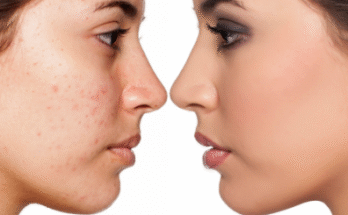Acne scars are a common skin concern that many people experience after dealing with breakouts.
While acne itself can be frustrating, the marks it leaves behind may feel even more discouraging.
The good news is that there are safe, simple, and natural ways you can reduce the appearance of scars from the comfort of your home.
With patience, consistency, and the right approach, your skin can look smoother and healthier over time.
Understanding Acne Scars
Before learning how to care for acne scars at home, it helps to understand what they are. When acne lesions such as pimples or cysts damage the skin, the healing process sometimes creates marks or indentations. Some scars may appear as dark spots, while others may cause texture changes.
The most common types include:
- Post-inflammatory hyperpigmentation: These are flat dark spots left after acne heals.
- Atrophic scars: These cause small indentations or depressions in the skin.
- Hypertrophic scars: These are raised and thicker than normal skin tissue.
While some scars fade naturally with time, others may linger. Home remedies cannot always remove scars completely, but they can reduce their visibility and support the skin’s natural healing.
Gentle Daily Care
One of the most effective steps in reducing acne scars is simply caring for your skin gently every day. Many people think that scrubbing harder will remove scars, but in reality, harsh treatments often make them worse. Instead, cleansing the skin with a mild, non-drying face wash twice a day helps remove impurities without irritating it. Following up with a lightweight, non-comedogenic moisturizer keeps the skin hydrated, which is important for healing.
Sunscreen is another powerful ally. Scars tend to darken when exposed to sunlight, so applying a broad-spectrum sunscreen daily can prevent spots from becoming more noticeable. This single habit can make a major difference over time.
Natural Remedies at Home
Several household ingredients and natural remedies can support skin renewal. They are not miracle cures, but when used consistently, they may help fade scars and even out skin tone.
Aloe Vera
Aloe vera is widely known for its soothing and healing properties. Applying fresh aloe gel to scars may calm irritation, reduce redness, and promote a more even complexion. Leaving it on the skin for about 20 minutes before rinsing can be an easy addition to your evening routine.
Honey
Honey is a natural moisturizer that also has antibacterial properties. Applying a thin layer of raw honey to scarred areas and rinsing it off after 15–20 minutes may help keep the skin soft and aid in repair.
Lemon Juice (with caution)
Some people use diluted lemon juice to lighten dark spots because it contains natural acids that exfoliate the skin. However, it can be harsh, so it should always be diluted with water and followed by sunscreen during the day. A safer approach is to try it only once or twice a week and see how your skin reacts.
Coconut Oil
Coconut oil is rich in fatty acids that may help with skin repair. A gentle massage with a small amount of coconut oil can increase circulation and hydration, though those with oily or acne-prone skin should use it carefully to avoid clogging pores.
Green Tea Extract
Green tea is packed with antioxidants that are beneficial for skin health. Cooled green tea bags can be applied to the skin to reduce inflammation and redness. Some people also use green tea extract mixed with water as a natural toner.
At-Home Practices for Skin Renewal
In addition to natural remedies, there are simple lifestyle and self-care practices that can promote healing and reduce scars.
Gentle Exfoliation
Exfoliating once or twice a week with a mild scrub or natural ingredients like oatmeal can help remove dead skin cells and encourage regeneration. Over-exfoliating, however, can cause irritation and worsen scars, so moderation is key.
Hydration and Nutrition
What you put inside your body matters just as much as what you apply on your skin. Drinking enough water supports natural detoxification, while eating foods rich in vitamins A, C, and E helps your skin repair itself. Fresh fruits, leafy greens, nuts, and seeds are all excellent choices.
Avoiding Picking or Touching
It can be tempting to pick at scars or leftover pimples, but touching your face often delays healing and can create more noticeable marks. Keeping your hands away from your face allows your skin to recover without additional irritation.
Proper Sleep
During sleep, your body produces collagen and repairs damaged cells, which is essential for scar healing. Aiming for at least seven to eight hours of restful sleep each night helps your skin regenerate naturally.
Over-the-Counter Options
For those looking for something slightly stronger than kitchen remedies, there are gentle over-the-counter products that can be used at home. Options such as vitamin C serums, retinoid creams, and products with niacinamide are widely available and known for their ability to improve skin texture and reduce pigmentation. These should always be introduced slowly into your routine to avoid irritation.
Patience and Consistency
One of the most important things to remember is that reducing acne scars at home is not an overnight process. Even the most effective remedies take time to show results. With consistent care, small improvements become noticeable after weeks or months. The goal is progress, not perfection, and a healthy skincare routine will also help prevent new scars from forming.
When to Consider Professional Help
Although home remedies can be helpful, some scars are more stubborn and may need professional treatments for visible improvement. Dermatologists can offer solutions such as chemical peels, laser therapy, or microneedling, which often provide faster results. If scars cause significant concern, seeking professional advice is always a good idea.
Building Confidence Beyond Scars
Acne scars may sometimes feel like a barrier to confidence, but it is important to remember that everyone’s skin tells a unique story. Many people experience scars at some point in their lives, and they do not define beauty or self-worth. Taking care of your skin at home is not only about reducing scars but also about practicing self-care and showing kindness to yourself.
Final Thoughts
Reducing acne scars at home is possible with patience, gentle care, and consistent use of natural remedies or over-the-counter products. From aloe vera and honey to a balanced diet and proper sleep, these small, everyday practices can add up to healthier skin over time. While not all scars can disappear completely without professional treatment, you can significantly improve their appearance and restore your skin’s natural glow with persistence and care.

